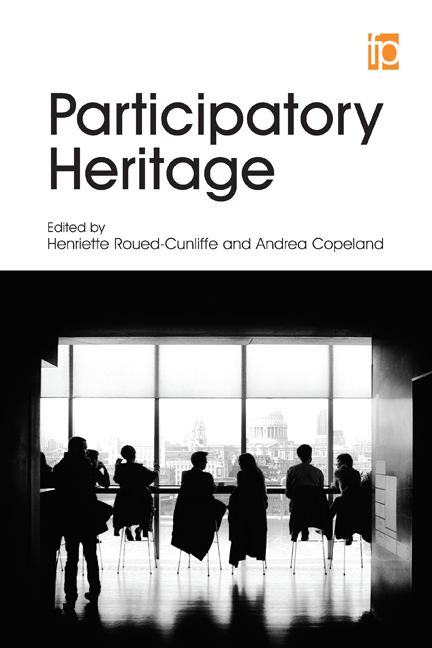Book contents
- Frontmatter
- Contents
- List of figures and tables
- Contributors
- Introduction: what is participatory heritage?
- Part 1 Participants
- Part 2 Challenges
- Part 3 Solutions
- 14 Ethiopian stories in an English landscape
- 15 Having a lovely time: localized crowdsourcing to create a 1930s street view of Bristol from a digitized postcard collection
- 16 Digital archiving in Canadian artist-run centres
- 17 New approaches to the community recording and preservation of burial space
- 18 A case for collaboration: solving practical problems in cultural heritage digitization projects
- 19 Open heritage data and APIs
- Further reading
- Index
14 - Ethiopian stories in an English landscape
from Part 3 - Solutions
Published online by Cambridge University Press: 08 June 2018
- Frontmatter
- Contents
- List of figures and tables
- Contributors
- Introduction: what is participatory heritage?
- Part 1 Participants
- Part 2 Challenges
- Part 3 Solutions
- 14 Ethiopian stories in an English landscape
- 15 Having a lovely time: localized crowdsourcing to create a 1930s street view of Bristol from a digitized postcard collection
- 16 Digital archiving in Canadian artist-run centres
- 17 New approaches to the community recording and preservation of burial space
- 18 A case for collaboration: solving practical problems in cultural heritage digitization projects
- 19 Open heritage data and APIs
- Further reading
- Index
Summary
New alternative narratives
WHEN MUSSOLINI INVADED Ethiopia's capital in May 1935, he forced its Emperor, Haile Selassie I, into exile. The Emperor arrived in the city of Bath, England, in October 1936, and lived in a property called Fairfield House with his family, government advisors and Orthodox priests. After returning to Ethiopia in 1941, the Emperor gave the house to the city of Bath as a gift to be used by aged citizens. This chapter explores the legacy of this period in Bath's history and what it means for the people living and visiting there today. I will discuss attempts to introduce this alternative historical narrative into the fabric of Bath's identity and beyond, discussing reflexively through my experiences of working in a voluntary capacity with Fairfield over a period of 17 years.
To understand the modern-day impact of this Ethiopian Emperor living in Bath, it is important to state that Haile Selassie I is viewed as a deity by members of the Rastafari faith. Whilst it is not only Rastafari that are interested in this history and recognize its importance (as will be discussed below), it is undoubtedly Rastafari that have most kept the name of Haile Selassie alive in public consciousness, especially through lyrics in reggae music and the use of the Emperor's face on items such as clothing, flags and other tributes. The complexity of feelings towards the legacy of this history is summed up by the Rastafari High Priest for the South West UK region, Honourable Ras Bandele Selassie:
It makes me feel sad, and it makes me glad, because the reason for His Majesty to be here is through the sadness of his heart. If the sadness never occurred, then the gladness of me being here today would not have occurred. The gladness of … the elderly being looked after here would not have occurred. The gladness of Rastafari having celebrations here would not have occurred. Many things that are happening in Bath now … the love that we feel would not have occurred. So for that, whilst I am sad I am glad.
This notion, that the memory that sites hold acts as a source of both pain and comfort, positions Fairfield as an embodiment of what historian Olivette Otele refers to as a ‘reluctant site of memory – a seen or unseen space that owes their very existence to brutal European colonial conquest’.
- Type
- Chapter
- Information
- Participatory Heritage , pp. 143 - 152Publisher: FacetPrint publication year: 2017



